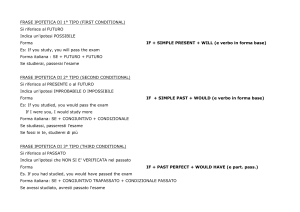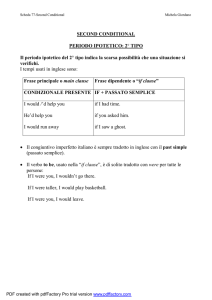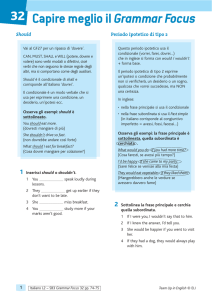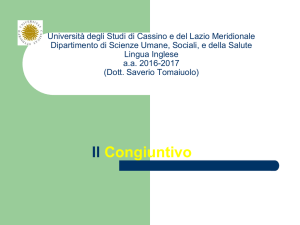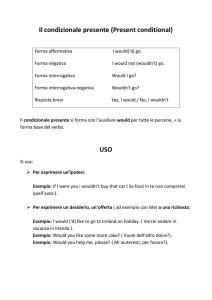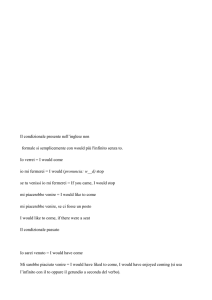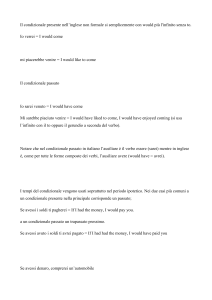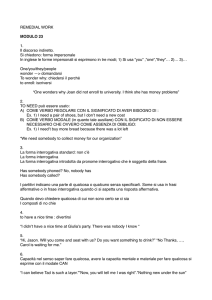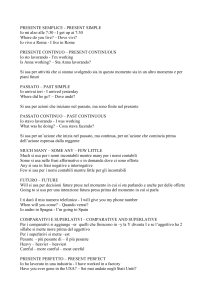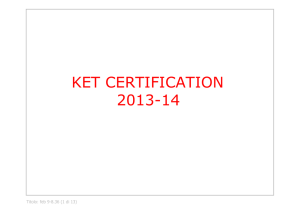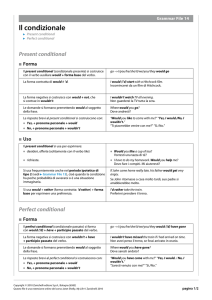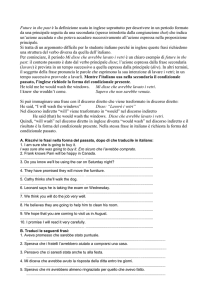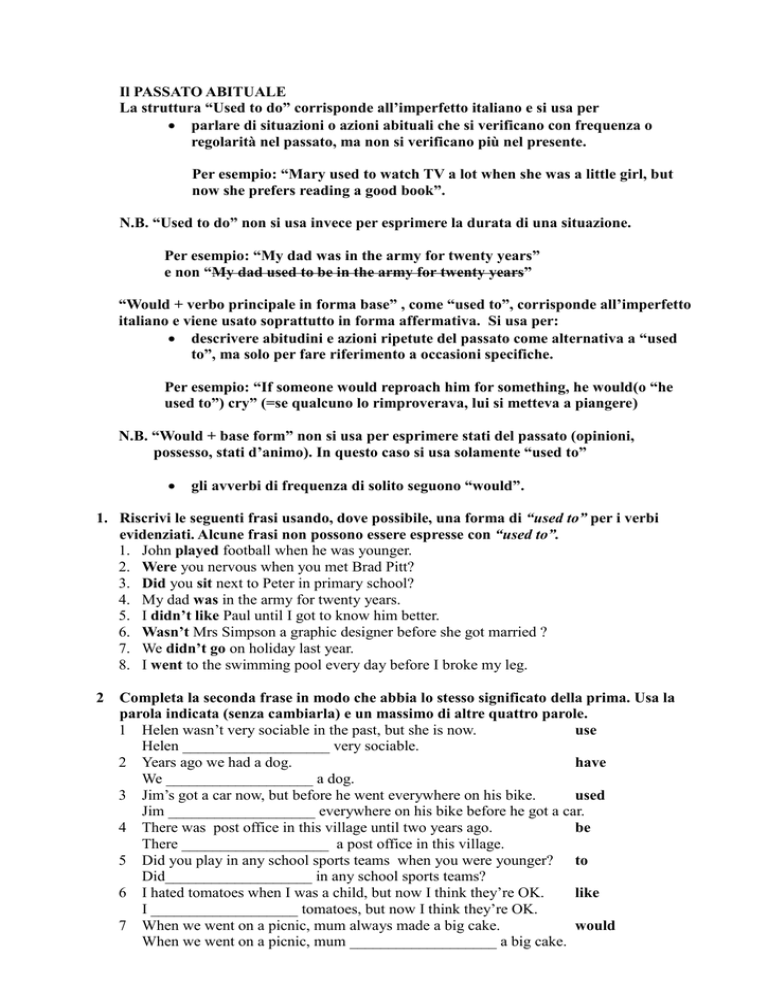
Il PASSATO ABITUALE
La struttura “Used to do” corrisponde all’imperfetto italiano e si usa per
parlare di situazioni o azioni abituali che si verificano con frequenza o
regolarità nel passato, ma non si verificano più nel presente.
Per esempio: “Mary used to watch TV a lot when she was a little girl, but
now she prefers reading a good book”.
N.B. “Used to do” non si usa invece per esprimere la durata di una situazione.
Per esempio: “My dad was in the army for twenty years”
e non “My dad used to be in the army for twenty years”
“Would + verbo principale in forma base” , come “used to”, corrisponde all’imperfetto
italiano e viene usato soprattutto in forma affermativa. Si usa per:
descrivere abitudini e azioni ripetute del passato come alternativa a “used
to”, ma solo per fare riferimento a occasioni specifiche.
Per esempio: “If someone would reproach him for something, he would(o “he
used to”) cry” (=se qualcuno lo rimproverava, lui si metteva a piangere)
N.B. “Would + base form” non si usa per esprimere stati del passato (opinioni,
possesso, stati d’animo). In questo caso si usa solamente “used to”
gli avverbi di frequenza di solito seguono “would”.
1. Riscrivi le seguenti frasi usando, dove possibile, una forma di “used to” per i verbi
evidenziati. Alcune frasi non possono essere espresse con “used to”.
1. John played football when he was younger.
2. Were you nervous when you met Brad Pitt?
3. Did you sit next to Peter in primary school?
4. My dad was in the army for twenty years.
5. I didn’t like Paul until I got to know him better.
6. Wasn’t Mrs Simpson a graphic designer before she got married ?
7. We didn’t go on holiday last year.
8. I went to the swimming pool every day before I broke my leg.
2
Completa la seconda frase in modo che abbia lo stesso significato della prima. Usa la
parola indicata (senza cambiarla) e un massimo di altre quattro parole.
1 Helen wasn’t very sociable in the past, but she is now.
use
Helen ___________________ very sociable.
2 Years ago we had a dog.
have
We ___________________ a dog.
3 Jim’s got a car now, but before he went everywhere on his bike.
used
Jim ___________________ everywhere on his bike before he got a car.
4 There was post office in this village until two years ago.
be
There ___________________ a post office in this village.
5 Did you play in any school sports teams when you were younger? to
Did___________________ in any school sports teams?
6 I hated tomatoes when I was a child, but now I think they’re OK.
like
I ___________________ tomatoes, but now I think they’re OK.
7 When we went on a picnic, mum always made a big cake.
would
When we went on a picnic, mum ___________________ a big cake.
3 Traduci le seguenti frasi usando used to o would.
1. Ogni volta che passava qualcuno, il cane abbaiava.
2. Jill mi prestava sempre dei soldi, se ne avevo bisogno.
3. Avevi i capelli lunghi quando eri bambina?
4. Non mi piaceva la maestra della scuola materna.
5. Andrew andava a scuola in bici. Adesso prende l’autobus.
6. La mamma si arrabbiava se la nostra camera era in disordine.
4 Margaret parla ai suoi nipotini delle vacanze che faceva quando era ragazza.
Sottolinea l’alternativa corretta tra quelle indicate. In alcuni casi entrambe le alternative
sono possibili.
When I was a child we always 0) went / used to go to my grandmother’s for our summer
holidays. We 1) didn’t have / wouldn’t have a car so we travelled there by train.
I 2) used to / would love the journey, although it was long. I 3) used to / would think about all
the things we could do at grandma’s. In fact she had a lovely big house near the sea. When we
finally arrived, all of us (I had two brothers and a sister) 4) used to / would go up to our rooms
to unpack and then we would run down to the beach for a swim before dinner. If the weather
5) was / used to be Ok, of course. Apart from the beach, there was always lots to do and see. At
the back of the house there was a farm, with lots of animals. The farmer was very friendly and
sometimes he 6) used to / would let us feed the animals. If it 7) rained / used to rain, there
was still lots to do in the house. Grandma’s house 8) was / would be big, as I said, and we
sometimes 9) used to / would play hide and seek for hours. My brother 10) thought / used to
think there was a ghost in the attic, so he was afraid to go up there. In the evenings we played
cards and sang songs. Grandma 11) used to / would accompany us on the piano. They seem
simple pleasures compared to today’s holiday villages and amusement parks, but we really
12) used to / would love our holidays and were always very sad to go home at the end of the
summer.
BE USED TO / GET USED TO
“ be used to” + oggetto o verbo+ing si usa per descrivere familiarità con qualcosa,consuetudine.
In italiano corrisponde a “essere abituato a”.
5. Completa la seconda frase in modo che abbia lo stesso significato della prima. Usa un
massimo di tre parole.
1. It’s not unusual for us to watch films in the original language.
We’re used______________________ films in the original language.
2. Sandra is my brother’s ex-girlfriend.
My brother used ______________________ out with Sandra.
3. It’s unusual to see Molly smiling all the time.
I’m not ______________________ Molly smile all the time.
4. It isn’t normal for Kevin to get up so early on a Sunday.
Kevin isn’t used ______________________ up so early on a Sunday.
5. When Lucy was a child, she loved playing with her dolls.
Lucy used ______________________ playing with her dolls when she was a child.
6. George still isn’t used to living in the country.
George hasn’t ______________________ living in the country yet.
6 Traduci le seguenti frasi usando “used to”.
1. Ti sei abituato alla tua nuova scuola?
2. Teresa non è abituata a cucinare per tutta la famiglia.
3. Quanto ci hai messo ad abituarti al nuovo insegnante?
4. Quando ero bambino non ero abituato a stare da solo.
5. Sally fumava, ma ha smesso un anno fa.
6. Pian piano ci stiamo abitando al nuovo computer.

